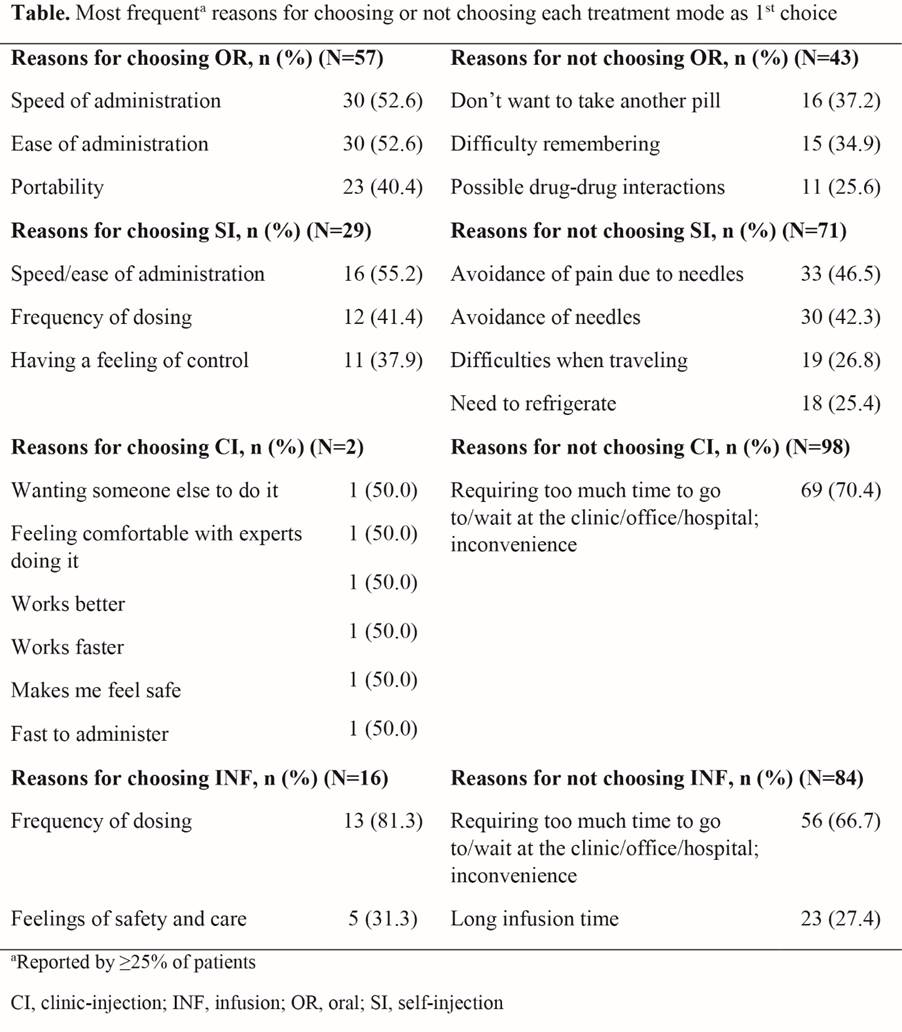Session Information
Date: Tuesday, October 23, 2018
Title: Patient Outcomes, Preferences, and Attitudes Poster II: Patient Perspectives
Session Type: ACR Poster Session C
Session Time: 9:00AM-11:00AM
Background/Purpose: Treatment recommendations in RA emphasize shared decision-making,1 but little is known about patient (pt) perspectives. Through qualitative research, we aim to understand pt preferences for RA treatment modes of administration and reasons for these preferences, to help guide pt-physician shared decision-making.
Methods: Pt-reported demographic and disease activity information was obtained at screening alongside qualitative interviews conducted using a semi-structured interview guide among adult pts with RA in Brazil, France, Germany, Italy, Spain, Switzerland, UK, and US who were currently taking a DMARD (biologic or non-biologic, including a JAK inhibitor). A 100-point allocation task was used to evaluate the strength of preference (0–100; 100 = strongest) across 4 treatment modes: oral (OR; once daily), self-injection (SI; weekly), clinic-injection (CI; weekly), and infusion (INF; monthly). Transcripts were developed in English; ATLAS.ti software (v7.5) was used for qualitative coding and analysis.
Results: 100 interviews were conducted (female: 75.0%; mean age: 53.9 yrs; mean time since diagnosis: 11.6 yrs). Of the 98 pts who described the severity of their RA, most (70.4%) experienced moderate/severe RA. The most commonly reported symptoms were pain/ache (90.0%), swelling/inflammation (58.0%), and fatigue (54.0%). Current RA medication modes included OR (60.0%), injection (57.0%), and INF (14.0%); 79.0% and 37.0% of pts had experience with injection and INF medications, respectively.
Among the 4 treatment modes, OR was allocated the highest mean (standard deviation) preference points (47.3 [33.1]) and was ranked as 1st choice by the greatest percentage of pts (57.0%), followed by SI (29.7 [27.7]; 29.0%), INF (15.4 [24.6]; 16.0%), and CI (7.5 [14.1]; 2.0%). Notably, the percentage of pts with a 1st choice rank for OR was greater in the US vs Europe (73.3% vs 50.0%; p<0.05). Overall, 56.0% of pts had a ‘strong’ 1st choice preference (ie, point allocation ≥70); the majority of these pts chose OR (62.5%) vs SI (23.2%), INF (10.7%), or CI (3.6%). Speed/ease of administration was the most common reason for pts choosing OR or SI (Table; 52.6%, 55.2%). The most common reason for pts not choosing OR was not wanting to take another pill (37.2%), and for not choosing SI it was to avoid pain due to needles (46.5%).
Conclusion: These data show the most important issues to pts regarding mode of administration of RA medication. Most pts preferred OR as an RA treatment mode, followed by SI. Rationales for preference included ease of use, safety concerns, dosing frequency, feelings of control, and avoidance of pain and needles. While 56.0% of pts had a strong preference for their 1st choice, nearly half did not and may be receptive to, and benefit from, discussions with their healthcare professional and/or pt support groups about RA treatment mode options to guide shared decision-making.
1. Singh JA et al. Arthritis Rheumatol 2016; 68: 1-26.
To cite this abstract in AMA style:
Taylor PC, Betteridge N, Brown TM, Woolcott J, Kivitz AJ, Zerbini CAF, Whalley D, Olayinka-Amao O, Chen C, Dahl P, Ponce de Leon D, Gruben D, Fallon L. Treatment Modes in Rheumatoid Arthritis: Moving Toward Shared Decision-Making [abstract]. Arthritis Rheumatol. 2018; 70 (suppl 9). https://acrabstracts.org/abstract/treatment-modes-in-rheumatoid-arthritis-moving-toward-shared-decision-making/. Accessed .« Back to 2018 ACR/ARHP Annual Meeting
ACR Meeting Abstracts - https://acrabstracts.org/abstract/treatment-modes-in-rheumatoid-arthritis-moving-toward-shared-decision-making/

